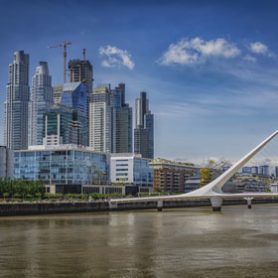Investing in a new Argentina

There is no doubt that 2016 was a significant year, in terms of economics, for Argentina and the rest of the world. Foreign exchange restrictions, lags in exchange rate fluctuation, conflicts with ‘holdout’ creditors, subsidies, high energy prices, power cuts and an attempt to boost foreign reserves, were only some of the challenges facing the world’s southern-most country. Some uncertainty still lingers on. Yet, there is no doubt that Argentina is marching towards recovery. Not surprisingly, local and international investors currently see the Argentinean economy in a positive light.
True, the global economy faces strong headwinds and it could be argued Argentina’s economic optimism is not consistent with other parts of the world. Take US economic policy, for example. Even cautious investors were surprised by Donald Trump’s triumph in the US elections. The challenge is adjusting investment decisions to the new administration’s economic policy, which will inevitably have global repercussions. Investors now need to identify acceptable risk levels and recalibrate their portfolios to avoid any future shocks.
Global uncertainty forces us to be more cautious, as investors have adopted a more conservative outlook and opt for safer options. They will have to be cautious about the fundamentals of the economy, including exchange rates and the rise of US bond prices. Volatility will be the order of the day, at least until the new US president and his administration spell out their policies and their consequences on emerging markets are clear.
Argentina’s capital market offers profitable options for all types of investors. PUENTE, a financial services firm based in Argentina, Paraguay and Uruguay, is one of the most prominent financial services companies in the Southern Cone, providing clients with investment advice tailored to their needs.
Dollar-denominated bonds provide an investment opportunity worth exploring, if the alternative is keeping dollars in safe deposit boxes or fixed-term deposits. Over recent months, many Argentinean provinces benefited from a relatively favourable economic environment and borrowed in the international capital markets. Their bonds present investors with unique opportunities. For example, take the bond issued by Buenos Aires with yields of 6%, maturing in 2021, or bonds issued by the province of Córdoba, which yields 6.5% and matures in 2021, Salta’s bonus yields 7.5% and matures in 2024 and the bond of the Province of Mendoza yields 8% and matures in 2024. All these bonds offer annual yields in US$.
As for corporate bonds, the YPF 2024 and IRSA 2023 bonds yield 8% and 8.5% per annum in US$ respectively. Bonds in pesos such as the LEBACS yield nearly 24% per annum. To hedge in pesos against volatility in local interest rates, there are bonds that adjust for BADLAR (the average interest rate paid by the banks on large size fixed-term deposits), yielding in some cases between 4% and 5% over the reference rate.
For more risk-taking investors, equities are another option. In 2017, several Argentinean companies will be preparing for a public offering and many other companies will benefit from the forecasted growth of the Argentinean economy, presenting investors with significant opportunities. Given the volatility of the market, investors should be aiming for an investment horizon of less than two years and ideally avoid compromising more than 15% of their portfolio.
Further information
www.puentenet.com


